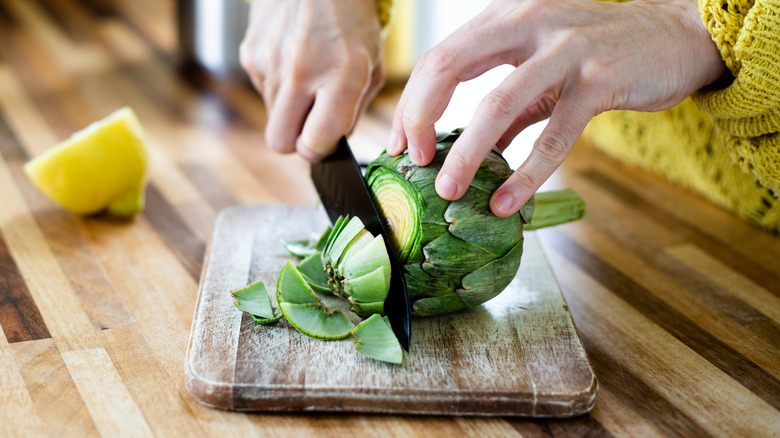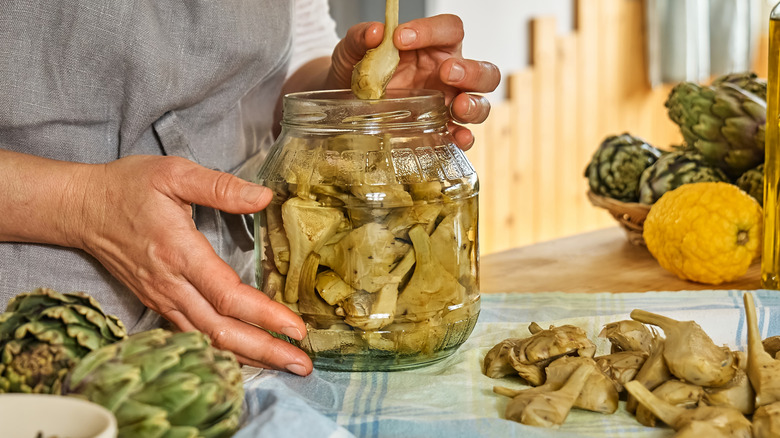An Underrated Vegetable With 4 Grams Of Protein Has More Antioxidants Than Blueberries
Antioxidants play a vital role in supporting your overall health. These nutrients protect you at the cellular level by neutralizing the damage caused by free radicals, the harmful molecules that have the potential to cause everything from cancer and cardiovascular disease to digestive disorders and neurological diseases. Eating a healthy, balanced diet rich in antioxidants can minimize their impact and help you stay healthy.
There are several foods that top the list, including blueberries, which are arguably the most popular of them all. They are pretty great for you – there are many health benefits to eating blueberries every day — but purely from the perspective of boosting your antioxidant intake, there's one surprising food that surpasses the berry's efficacy: artichokes. Unlike the fruit, artichokes contain a potent antioxidant known as chlorogenic acid.
Known for its unique, thickened outer bracts that resemble puffy leaves, the artichoke is commonly mistaken for a vegetable. However, the edible portion is actually a flower bud of a thistle plant. It's rich in flavor and antioxidants — and technically, you can eat the whole thing. Registered dietitian Beth Czerwony, RD, LD, tells Cleveland Clinic, "Artichoke hearts are soft and meaty. But the plant's petals and stems are equally tasty and nutritious."
Artichokes are packed with health benefits
Chlorogenic acids set artichokes apart from other antioxidant-rich foods. Ildi Revi, the Chief Coffee Officer at Purity Organic Coffee, explains to First, "They represent an abundant group of plant polyphenols that are in many foods and beverages in the human diet, including coffee and tea, as well as several fruits and vegetables." Chlorogenic acid can be tremendously beneficial to overall health, protecting you from damaging free radicals while regulating blood sugar levels.
The chlorogenic acid in artichokes also serves as a potent anti-inflammatory, per 2022 research in BioMed Research International. What's more, artichokes' potent flavonoid content (which is primarily found in the head and the leaves) adds to those effects, protecting the body from oxidative stress that could cause damage at the cellular level.
Another key reason artichokes are considered such a superfood is because they're rich in protein: A single artichoke has just shy of 5 grams. (Here are other great protein sources that aren't meat.) Additionally, artichokes contain the soluble fiber inulin, which improves satiety and helps prevent blood sugar spikes and overeating. For this same reason, this high-protein vegetable can help you poop instantly.
Artichokes may even help you sleep more soundly. A single medium artichoke contains 77 milligrams of magnesium, or 18% of your daily value. The mineral plays a vital role in muscle relaxation, which in turn can help you wind down for the night.
How to eat artichokes
There are many ways to enjoy artichokes, from classic preparations to more modern twists. Pickled artichokes, for example, offer a tangy, briny flavor that's perfect in salads, antipasto platters, or even straight from the jar. If you're hoping to capitalize on its health benefits, take note: 2008 research published in the Journal of Agricultural and Food Chemistry found that both steaming and boiling the plant increased its antioxidant capacity.
This could be because the cooking methods soften the artichoke's structure (its matrix), thereby making the beneficial compounds more bioavailable to your body. However, the same research saw flavonoids decreased. That's why it's so smart to switch up your cooking preparations. You can roast artichokes to caramelize them, steam them for a softer texture and a bit of a nutty bite, or even shave them raw over a salad for a little protein and flavonoid kick.
This varied approach keeps things interesting, allowing you to reap the artichoke's maximum health benefits while enjoying its unique flavor and texture in different ways.


